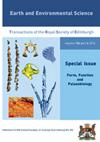科学、形而上学与加尔文主义:詹姆斯·克罗尔的上帝
IF 1.2
4区 地球科学
Q4 GEOSCIENCES, MULTIDISCIPLINARY
Earth and Environmental Science Transactions of the Royal Society of Edinburgh
Pub Date : 2021-05-10
DOI:10.1017/S1755691021000190
引用次数: 3
摘要
对詹姆斯·克罗尔来说,科学始于形而上学,终于形而上学。反过来,形而上学提供了所有事物的最初原因和最终原因的证据。这一证明基于两个形而上学的原则:每一个事件都必须有一个原因,而原因的确定与其产生是不同的。这一论点源于他根深蒂固的宗教信仰。17岁时,他皈依了加尔文主义和福音派基督教。经过一段时间对加尔文主义制度的质疑,他通过阅读新英格兰神学家乔纳森·爱德华兹关于遗嘱的著名论文再次接受了加尔文主义。这部坚定的形而上学作品既涉及启蒙思想,也涉及加尔文主义,捍卫了意志不是人类行动的自决原因的观点。这一“棘手的案件”为更大的主张提供了基础,即每一个行为都有其原因,并且行为的产生与其确定不同。在一定程度上,通过阅读爱德华兹,克罗尔在他的余生中一直是一个虔诚而坚定的“温和”加尔文主义者。他还对形而上学产生了深深的热爱,并坚信如果没有形而上学,包括科学在内的一切都会变得困惑和黑暗。对克罗尔来说,即使是最基础的科学,如果没有先验的形而上学原则,也不可能正确地进行。但这不仅仅是关于科学探究的哲学基础的争论。这也是基于克罗尔的信念,即宇宙、地球历史和生命(包括他自己的)完全由至高无上的完美智慧决定。这种信念进入了克罗尔科学理论的精髓,并塑造了他对自己生活曲折的解释。简而言之,为了认真对待克罗尔自己的自我理解,我们需要允许他“做上帝”。本文章由计算机程序翻译,如有差异,请以英文原文为准。
Science, metaphysics and Calvinism: the God of James Croll
Science, for James Croll, began and ended in metaphysics. Metaphysics, in turn, provided proof of a First and Final Cause of all things. This proof rested on two metaphysical principles: that every event must have a cause, and that the determination of a cause is distinct from its production. This argument emerged from his deeply held religious commitments. As a 17-year-old, he converted to a Calvinist and evangelical form of Christianity. After a period of questioning the Calvinist system, he embraced it again through reading the famous treatise on the will by the New England theologian, Jonathan Edwards. This determinedly metaphysical work, which engaged as much with Enlightenment thought as with Calvinism, defended the view that the will was not a self-determining cause of human action. This ‘hard case’ provided the basis for a larger claim that every act whatever has a cause, and that the production of an act was different from its determination. In part through reading Edwards, Croll remained a devout and convinced ‘moderate’ Calvinist for the rest of his life. He also developed a deep love of metaphysics and became convinced that without it, everything, including science, remained confused and in darkness. For Croll, even the most basic science could not be properly conducted without prior metaphysical principles. But this was more than just an argument about the philosophical foundations of scientific inquiry. It was also based on Croll's conviction that the cosmos, earth history and life (including his own) was fully determined by a supreme and perfect intellect. This conviction entered into the marrow of Croll's scientific theories and shaped his interpretation of the twists and turns of his own life. In short, to take seriously Croll's own self-understanding, we need to allow him to ‘do God’.
求助全文
通过发布文献求助,成功后即可免费获取论文全文。
去求助
来源期刊
CiteScore
2.00
自引率
0.00%
发文量
21
期刊介绍:
Earth and Environmental Science Transactions (formerly Transactions of the Royal Society of Edinburgh: Earth Sciences) is a general earth sciences journal publishing a comprehensive selection of substantial peer-reviewed research papers, reviews and short communications of international standard across the broad spectrum of the Earth and its surface environments. The journal prides itself on the quality of its graphics and photographic reproduction. The Editors are keen to encourage interdisciplinary papers and Transactions also publishes occasional special symposia and invited volumes of specific interest.
We are currently in the process of digitising the archive of RSE Publications, and the archive of the Transactions, dating back to 1788, will be available from the back issues link on this site.

 求助内容:
求助内容: 应助结果提醒方式:
应助结果提醒方式:


